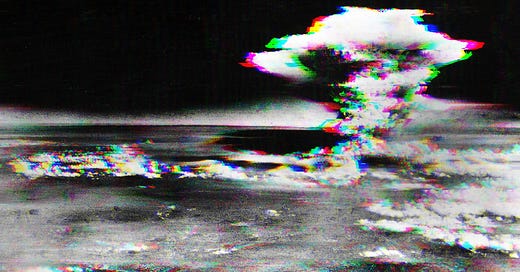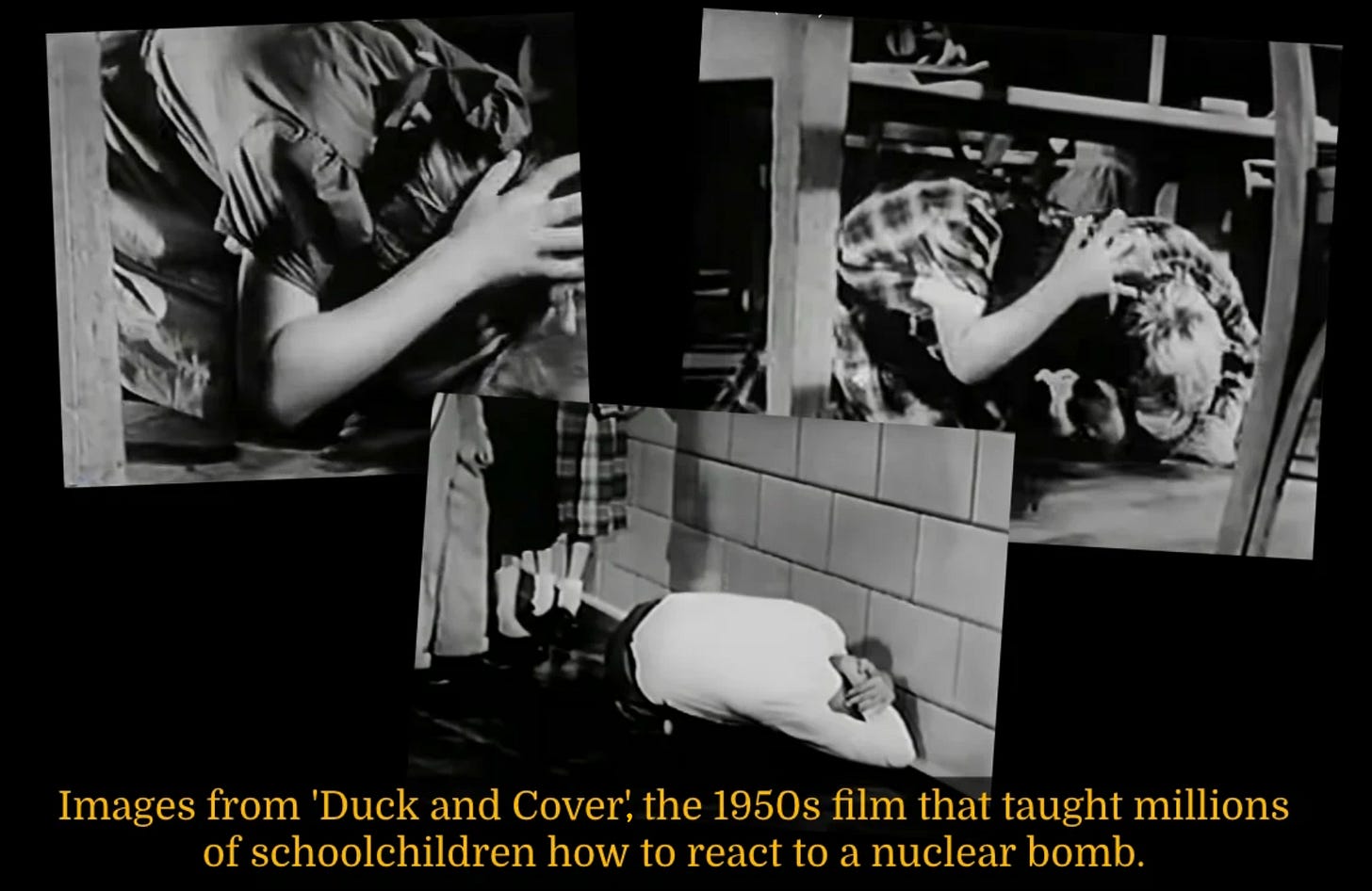An aerial photo (colorized by us) shows the explosion over Hiroshima, Japan, on Aug. 6, 1945, shortly after the "Little Boy" atomic bomb was dropped.
TRANSCRIPT: ‘An Atomic Experience,’ Episode 1 in ‘The Hart of the Matter’ Podcast Series
The following interview took place at Bill Hart’s Appalachian home, deep in the West Virginia hills, one rainy day in February 2023. Around the table were: Bill, his dear friend Bob Webb, and podcast host and longtime co-friend Douglas John Imbrogno. Below are highlights from the full podcast interview that you can hear above.
Douglas John Imbrogno: Welcome to 'The Hart of the Matter.' We're going to be talking with Bill Hart today about the time his dad invited him to an atom bomb watching party. Set us up and tell us why you were in Hawaii. And then what your father suggested you go look at ...
Bill Hart: Early in my dad's career, his literary skills were noted—his ability to communicate. He was fast tracked into being a ship handler and a communicator. We moved to Hawaii in early' 62, maybe late '61. I attended the second through the fourth grade, inclusive. It was not that long after World War II. And we lived at the mouth of Pearl Harbor.
And my dad told people that would ask, 'How are you and where do you work?' And he'd look at him and say: 'I live at Pearl and I work in a pineapple field ...' But what he really worked at was in a pineapple field, but there was a small house and he worked in a bomb-proof shelter. You went in a small house and then went down 10 stories in bedrock, in lava rock.
My Dad said: “You ought to go down to the beach about nine o'clock and look around. Think you'll see something interesting ...”
As a naval communicator, at the time, he was involved with tests. Testing out long-range radios of different sorts. And technology was evolving. There was also the Cuban Missile Crisis that occurred in, like, late '62. The United States was blowing up islands with regularity in the South Pacific. And they decided that wasn't too cool, but they wanted to see what high altitude tests would do. The Navy had various ships and planes at sea all around the Pacific and people listening. And they launched a thing called operation ‘Starfish Prime.' And they sent a rocket up to 400 miles, straight up over an island 900 miles away. And it was accompanied by ... smaller rockets with telemetry gathering capabilities.
And just out of the blue out night my Dad said: 'You ought to go down to the beach about nine o'clock and look around. Think you'll see something interesting ...' A bit nuts for a nine-year-old boy to go down to the beach at nine o'clock by himself and look around. But it wasn't far. Went down there at the right time by 8:30. Started looking around. I didn't want to miss whatever it was. And right on schedule—about 9:15, 9:19—one-third of the sky lit up! It was a 1.2 megaton blast, I think. It went off at 250 miles of altitude.
DI: A nuclear blast ...
BH: A nuclear blast. An impressive one. And they, quote, 'salted' that weapon with other radioactive components. It helped the explosive yield that left trace elements in the air that they could pick up in airplanes all across the United States—it blew that way. The Russians had planes, too. They were monitoring each other.
The building still standing in the background is the Hiroshima Prefectural Industrial Promotion Hall, now preserved as the Atomic Bomb Dome. | AP Photo/Stanley Troutman
Hiroshima, Nagasaki, were no more than 25 kilotons, not megatons, of TNT equivalent. This is 1.2 megatons. We were doing ‘duck-and-cover’ in our little grade school, which was three miles away from Pearl Harbor, the main naval base. And—look at the whole sky light up!. [There were] bright streamers, really exotic looking colors—blues and purples—as high energy-electrons went out they were illuminating nearby clouds.
It was kind of cool in a way but ... you thought about what they were doing. And I realized that duck- and-cover was a joke.
And shortly after, not that many years later, they realized they were poisoning the environment, the atmosphere. And the atmospheric Nuclear Test Ban Treaty was signed—it was a big deal: ‘You blow up stuff underground in your own home country ...’ But don't be contaminating the whole world with these high altitude blasts, which are getting bigger and bigger.
But it was quite impressive to watch this thing. And it was 900 miles away and it lit up 1/3 to half-of-the-sky with the streamers. And I never had seen anything like it. It was kind of cool in a way but ... You thought about what they were doing. And I realized that duck-and-cover was a joke. You know? [laughs]
And I'd read about Hiroshima and Nagasaki a little bit as a kid, you know. And that's an itty-bitty bomb that did that to the city. You know, I'm three miles away from Pearl Harbor, one of the most strategic targets on the Pacific. Uh-huh .....
DI: So, your dad came close to breaching operational security, telling his nine-year-old son to go down to the beach ... I'm sorry, I'm just joking about that. But did you guys talk about it afterwards, what you saw?
BH: Everybody in Hawaii was talking about it! He did not breach operational security. They had nuclear bomb watching parties. And there were prominent hotels and they were serving liquor at night and people went on their patios to watch this thing that was going to happen, [that] supposedly, you might be able to be seeing. It was going to be seen by people! So, they were, like, prepped in advance.
And nuclear technology was going to make electrical power too cheap to regulate—just almost give it away. And everybody was looking forward to that. And you know, they were doing all kinds of crazy things when nuclear energy was an unexplored resource in late '50s and early '60s. But it was also a strategic investment in our nation's defense. And there was an arms race going on. And that was part of it.
In Hawaii, it totally destroyed inter-island communication via the microwave. And it blew out many streetlights in Hawaii. It took the majority of them out in my corner of Honolulu. The wires that went around in a circle had enough transformer-like ability ... and they picked up the EMP pulse from 900 miles away. And it took out the streetlights. 'Why do grown men play such fruitless games ...'
There were early garage door openers that were tube operated, maybe transistors. But that was a cool thing, if you could open your garage door in '63 from your car ... Garage doors started going up and down. Some of 'em went up and stayed. But they, like, blew their minds, too ... There were a lot of side effects. And that was in Hawaii. There were other islands a lot closer and who knows what happened on them. But I never forgot that ...
Bob Webb: And if I could interject, some people predict that if there ever is a nuclear war, that it won't be dropping bombs directly on the United States. It will be exploding a series of nuclear warheads at a certain elevation, at certain points above the United States, which will wipe out—with the EMP—all of our electronics that are not in a Faraday cage.
BH: Everything. That means satellites go down. Stereos go down. Internet dies ...
DI: Not my cell phone!!!
BH: Your cell phone dies. People that get money electronically are now impoverished. In the midst of a low-level nuclear exchange ...
DI: Can you remember as a nine-year-old … you were probably impressed. But were you also scared and freaked out?
BH: At first, I really didn't know what I was looking at and you just go down to the beach and look around.
DI: Could have been fireworks ...
BH: It was on an unimaginably gargantuan scale. Like, whoa ...
BH: Of course, it made the papers and explanations and all this stuff. When I learned about the yield and blast effects, I was moderately freaked out and thought this duck-and-cover thing that we were doing at our grade school was a joke! It was like putting a band-aid on in your leg after it was sawed off. You would just hemorrhage to death if you didn’t put a tourniquet to keep the main body alive ...
ALSO in THE HART of the MATTER:
Major is one smart horse, but keeping him off the porch is an ongoing challenge. READ ON











Share this post